

The Graham Strong Website
interesting. Building valve and transistor radios, repairing T.V.’s for neighbours, I even made an oscilloscope and had it displayed in the school radio club.
Around this time I had a second-
To me, Dr. Who was just another sci-
I can’t recall if I actually recorded the first episode of Doctor Who. The earliest recording I still have was the first episode of The Keys of Marinus first shown on 11 April 1964. Recordings were made via a basic crystal microphone (which came with the machine), hanging over the television speaker with a plant pot placed on the top of the T.V. to keep the microphone in place! Mother was given instructions to not enter the room when ‘recording was in session’! Original programs were recorded at the standard ‘domestic’ tape speed of 3¾ inches per second, but the machine suffered some ‘personalisation by young Strong’. Inside the machine was an electric motor powered by the mains electricity. In the UK the frequency of the mains is 50 hertz. This frequency determines the motor speed. The machine was also intended for sale in the U.S.A. where the mains frequency is 60 hertz. Attached to the motor was a (smaller) brass collar for use in the States. By swapping the two collar’s around, I was able to obtain somewhere around a 2½ inches per second tape speed and thus gain more recording time. Wow!
Here is a picture of my first tape recorder -
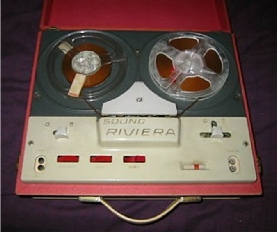
Being at school, my stock of tapes was limited and recordings had to be overwritten by new ones, thus losing the original.
It was not until much later in life I realised that most of my preserved audio recordings of Dr.Who were missing from the BBC archives due to them having a ‘clear out’ to make space for new material.
By the end of 1965 the Sound Riviera machine was wearing out, and I purchased (over 52 weekly payments through my Mother's Gratton club book) a new Philips EL3548 tape recorder.
Here is a picture of tape recorder number 2:
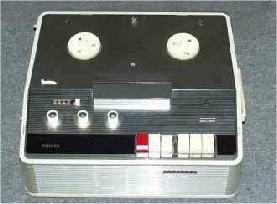
The EL3548 was mostly transistor, only the loudspeaker output and ‘magic-
TV's of that era were made with valves and the metal chassis was connected to one wire from the mains plug. This avoided having a large and expensive mains transformer inside. Normally any metal part of the TV was kept away from the outside case for safety reasons. Connecting up the recorder in this way (potentially) made the tape recorder live. I had to ensure that the TV had the neutral side of the mains supply connected to the chassis (to avoid electric shock) and disconnect the earth from the tape recorder. Using this new machine I was able to record in much better quality than before and with no external noises. In 1966 I found employment and was able to buy more tapes when needed. I used the 1
Episode 11 of the Dalek Master Plan was not recorded and I cannot recall why. Maybe I was not at home that evening (tape recorders and TV's had to be manually switched on in those days), something modern technology has overcome! Or I decided the story didn’t warrant keeping and it was overwritten the following week.
The Celestial Toymaker was another story not retained, as I personally didn't like the story. Looking back in hindsight though, I wish I had kept those recordings.
When this recorder eventually died, the replacement a Philips N4414 was purchased in 1974. I still have it today and it's in excellent working order. A few rubber bands have been replaced over the years and some routine servicing, but that's to be expected. You may notice from the picture that it has yet again received the ‘Strong’ treatment and been modified. Firstly to be able to play back my previous Dr. Who recordings. This new tape recorder only catered for 3¾ and 7½ inch per second tape speeds, providing better quality. My previous recordings were recorded at 1⅞ inch per second speed and the new Philips machine needed modification.
Here’s a photo of my current tape recorder:
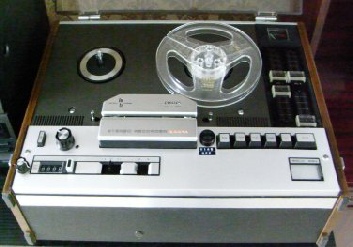
We now move on to 1994 when following an accidental meeting with an avid Doctor Who fan who had contacts in the BBC, insisted my tapes were taken to the BBC in London for them to borrow. This we did, and an enjoyable day out it was. Being escorted around the studios and seeing some of their professional equipment, even an opportunity to view into one of the studios.
After some reassurance that my tapes would be carefully cared for, I left them at the BBC. My four tapes contained over 100 Doctor Who episodes and the BBC copied them onto a digital format for storage. About a year later another "home recordist" (David Holman) came forward, and it seems that between us we had virtually covered all the missing Doctor Who episodes at least in audio format. David was subsequently encouraged to visit the BBC with his tapes and we all enjoyed another day out at the BBC studios! Although David used the faster 3¾ inches per second recording speed, he used a microphone. My recordings are (as far as is known) the only ones made directly, and therefore have no unwanted external sounds. They have been (proudly) referred to as ‘The Crystal Clear Recordings’!
To find out more about my recordings, from the BBC perspective, visit the link below to the Steve Roberts Restoration website. Click on the links "Audio Releases" then "Daleks' Master Plan" to read about the various recordings which the BBC have utilised in creating a fantastic supply of CD's and DVD's, filling blanks where video does not exist.
Thanks must also be given to Mark Ayres, who did such an excellent job in re-
Yes they have arrived. The colour version of The Power of the Daleks box set includes two Blu-
I was invited to the BBC studios in Bath for an interview about my recordings and how they were made. This was broadcast on Radio 4 on Boxing Day 2009 under “Archive on Four”. The full 60 minute program can be heard on a BBC audio CD as part of the "Dr. Who -
For those of you who happened to watch the One Show on 11 October 2013 will have been given another interview by yours truly. This was transmitted to coincide with the discovery of more missing episodes in film format. It has sadly fallen off the BBC iPlayer, but for those interested it can still be viewed on Youtube at the link below.
Further links:
2017 May 27 Rickmansworth Missing Episodes Venue
2016 Nov 5 Dr. Who and The Power of the Daleks
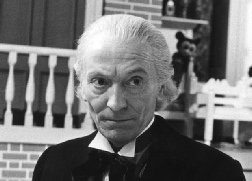
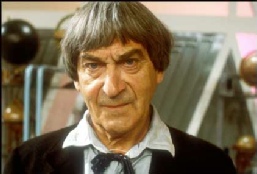
William Hartnell -
Patrick Troughton
Second Doctor
The date Saturday 23 November 1963, time around 5:15 pm.
A young 14 year old boy was sitting in front of the family television patiently waiting for the new Sci-
The television was a monochrome McMichael 17” with only two channels to choose from -
Doctor Who.
© Graham Strong 2015
- Archive_on_4 Missing_Episodes.mp3